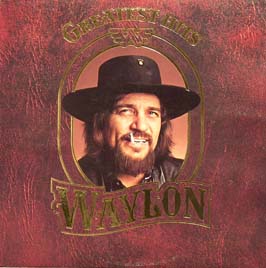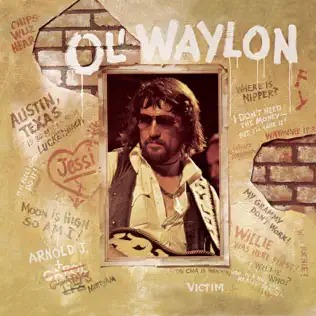
Waylon Arnold Jennings was an American singer, songwriter, musician, and actor. He is considered one of the pioneers of the outlaw movement in country music.

Mirriam Johnson, known professionally as Jessi Colter, is an American country singer who is best known for her collaborations with her second husband, country musician Waylon Jennings, and for her 1975 crossover hit "I'm Not Lisa".

Highwayman is the first studio album released by country supergroup The Highwaymen, comprising Kris Kristofferson, Johnny Cash, Waylon Jennings and Willie Nelson. Highwayman, released on Columbia Records in 1985, was the group's first and most successful album.

Nashville Rebel is the third studio album by American country music artist Waylon Jennings, released in December 1966 via RCA Victor. It reached #4 on the Billboard country albums chart.

Lonesome, On'ry and Mean is a studio album by American country music artist Waylon Jennings, released on RCA Victor in 1973. It was, after Good Hearted Woman and Ladies Love Outlaws, the third in a series of albums which were to establish Jennings as one of the most prominent representatives of the outlaw country movement. Like its successor, Honky Tonk Heroes, the album is considered an important milestone in the history of country music. It represented the first of Jennings' works produced and recorded by himself, following his fight for artistic freedom against the constraints of the Nashville recording establishment.

Honky Tonk Heroes is a country music album by Waylon Jennings, released in 1973 on RCA Victor. With the exception of the final track on the album, "We Had It All", all of the songs on the album were written or co-written by Billy Joe Shaver. The album is considered an important piece in the development of the outlaw sub-genre in country music as it revived the honky tonk music of Nashville and added elements of rock and roll to it.

This Time is a studio album by American country music artist Waylon Jennings, released on RCA Victor in 1974, at the peak of the outlaw country movement. It was produced by Jennings and Willie Nelson.

Dreaming My Dreams is the twenty-second studio album by American country music artist Waylon Jennings. The album was co-produced with Jack Clement and recorded at Glaser Sound Studios in Nashville, Tennessee, between February and July 1974.

Wanted! The Outlaws is a compilation album by Waylon Jennings, Willie Nelson, Jessi Colter, and Tompall Glaser, released by RCA Records in 1976. The album consists of previously released material with four new songs. Released to capitalize on the new outlaw country movement, Wanted! The Outlaws earned its place in music history by becoming the first country album to be platinum-certified, reaching sales of one million.

Waylon & Willie is a duet studio album by American singers Waylon Jennings and Willie Nelson, released by RCA Records in 1978. In the US, it stayed at #1 album on the country album charts for ten weeks and would spend a total of 126 weeks on the country charts.

Greatest Hits is a compilation album by American country music artist Waylon Jennings, released in 1979 by RCA Records.

Leather and Lace is a duet album by Waylon Jennings and Jessi Colter, released on RCA Records in 1981.

Waylon Live is a live album by Waylon Jennings, released on RCA Victor in 1976.

Ol' Waylon is a studio album by American country music artist Waylon Jennings. It was released on RCA Victor in 1977. It eventually became one of Jennings' highest-selling albums, due in no small part to the phenomenal success of the chart-topping "Luckenbach, Texas ." It was also the singer's fourth solo album in a row to reach the top of the country charts, remaining there for thirteen weeks and becoming country music's first platinum album by any single solo artist.

I've Always Been Crazy is a studio album by American country music artist Waylon Jennings, released on RCA Victor in 1978.

What Goes Around Comes Around is a studio album by American country music artist Waylon Jennings, released on RCA Victor in 1979.

Black on Black is a studio album by American country music artist Waylon Jennings, released on RCA Victor in 1982.

It's Only Rock & Roll is an album by Waylon Jennings, released on RCA Victor in 1983.

The discography of American country singer Jessi Colter consists of 13 studio albums, three compilation albums, 27 singles, 17 other album appearances, and one other charted song. Under her birth name Mirriam Johnson, she recorded two singles in 1961. Her first releases under the name Jessi Colter were issued by RCA Victor in 1969, beginning with A Country Star Is Born. The label also released several singles through 1972. Colter first had commercial success with the 1975 single "I'm Not Lisa". It topped the US country chart, reached number four on the US Hot 100 and number 16 on the US adult contemporary chart. It made similar positions in Canada, while also making multiple charts internationally. It was featured on the studio album I'm Jessi Colter. Released by Capitol Records, the album reached number four on the US country albums chart and number 50 on the US Billboard 200. The disc spawned the top five US country single "What's Happened to Blue Eyes".

Ralph Eugene Mooney was an American steel guitar player and songwriter, he was inducted into the Steel Guitar Hall of Fame in 1983. He was the original steel guitarist in Merle Haggard's band, The Strangers and Waylon Jennings's band, The Waylors.




















